News

17/11/2023
With World AMR Awareness Week (WAAW) upon us, we wish to put a spotlight on one of the ways FAO is seeking to improve food safety. Antimicrobial resistance (AMR) is a major global threat of increasing concern to human, animal and plant health with implications for food safety and food security as well as the livelihoods of millions of farming households. The way food is produced can be a factor in the development and spread of AMR.
As part of his awareness-raising activities during WAAW, Sakar Shivakoti, FAO National Coordinator, spoke with us about coordinating the Action...
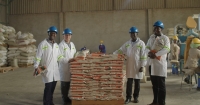
17/11/2023
An FAO mission to validate the data gathered on the food control system in Zimbabwe is being concluded today as part of an ongoing project to strengthen governance around food safety and plant health in 11 African Union countries.
The three-week mission involved field visits to abattoirs and agricultural manufacturing plants, meetings with Competent Authorities, and in-depth interviews with various authorities involved in the country’s food control system to review the evidence and verify data documenting the system’s effectiveness.
The validation mission comes after a four-month data collection period led by focal points from various agencies...
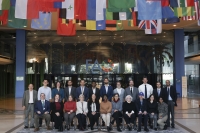
13/11/2023
A meeting convened by FAO opened today to explore the trends, impacts and challenges that food safety authorities and food business operators may face in the next 5-15 years as new food sources and food production systems take hold. In particular, the group of about 25 scientists are discussing: plant-based food production, precision fermentation and 3D printing of food.
New food sources and food production systems are growing – the sector also covers foods that are being consumed outside their traditional areas, such as insects and seaweed, as well as established technologies like precision fermentation that is...
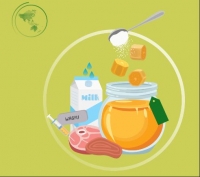
09/11/2023
While there is no internationally agreed definition, the term “food fraud” commonly describes a situation in which the consumer is deceived about the amount, quality and/or identity of the food they consume. Food fraud is economically motivated as an inferior product is fraudulently sold as if it were in fact superior. Food fraud is not designed to result in adverse health outcomes. However, some studies have indicated that in situations of marginal food security, food fraud may lead to under-nutrition.
Food fraud is an indicator that there is a blind spot in the oversight of food supply...
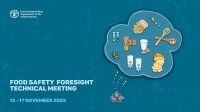
07/11/2023
Considering the global attention on the area of new food sources and production systems, FAO will host a Food Safety Foresight Technical Meeting to discuss the food safety implications of some new foods. From 13 to 17 November, technical experts from across the globe will meet in Rome to discuss the food safety implications for plant-based food products that mimic animal-derived foods, and products derived from precision fermentation and 3D food printing.
The foresight component of the meeting will see the participants engage in forward-thinking exercises that will explore what the future landscape of new foods may...
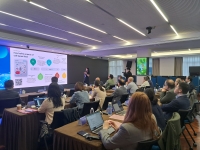
06/11/2023
On 6 November 2023, a stakeholder roundtable meeting was held in Shanghai, China, to discuss the latest development of cell-based food and precision fermentation, collecting insights and experiences from the developers and producers, so that relevant food safety considerations can be updated, contributing to effective risk assessment for competent authorities. Cell-based food refers to products that are developed by culturing cells isolated from animals, while precision fermentation is a process that uses microorganisms to produce specific food compounds and ingredients.
The meeting organized by the Food and Agriculture Organization of the United Nations (FAO) and the China...

30/10/2023
Last week FAO concluded an eight-month assessment of Mauritius’ food control system with a final workshop in Port Louis where high-level policy makers endorsed the recommendations of the final report of the assessment and committed to implementing its strategic plan. The assessment is part of "Strengthening of Capacities and Governance in Food and Phytosanitary Control,” a 5-million-euro project funded by the European Union which began in November 2022. The project entails providing technical support and working with Competent Authorities and other leading institutions in 11 African Union Member Countries. It is designed to build up capabilities, strengthen governance and...
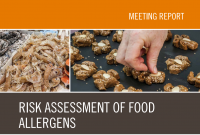
26/10/2023
Food allergens cause for concern among consumers, food business operators and regulators around the world. But, how much of a food allergen is enough to cause a dangerous allergic reaction? Having previously recommended allergic threshold values, or maximum safe limits, for cereals containing gluten, crustacea, eggs, fish, milk, peanuts, sesame and tree nuts (almond, cashew, hazelnut, pecan, pistachio and walnut) in foods, the ad hoc FAO/WHO Expert Committee on Food Allergens was ready to tackle additional allergens. In March 2023, Committee reconvened for a fifth time – this time to establish the thresholds of the following food allergens: soy,...

26/10/2023
Food in Madagascar is heavily dominated by imported products. The effective and efficient control of food imports is essential to protect consumer health. Efficient control of imported food is also essential to facilitate trade in Madagascar and to ensure consumers have ready and sustained access to safe and nutritious food. This was confirmed by the organizers of a workshop and programme to develop a risk-based control system for food imported to Madagascar, organized by the Food and Agriculture Organization of the United Nations (FAO) in collaboration with the Ministry of Industrialization, Trade and Consumption in Antananarivo, from...

20/10/2023
At the FAO-hosted World Food Forum in Rome, Vittorio Fattori and Keya Mukherjee from the Agrifood Systems and Food Safety Division presented how foresight can be used to strengthen food safety.
Agrifood systems today are evolving rapidly. Among the changes, global drivers and trends are affecting food safety in many different ways. “Foresight enables looking at emerging issues through a system lens by encouraging a holistic way of evaluating both opportunities and challenges in food safety," said Fattori.
The presentation explored the food safety implications of a range of areas identified through the FAO Food Safety Foresight Programme, including climate change, consumer...
Stay up to date and connect to our RSS feed!
